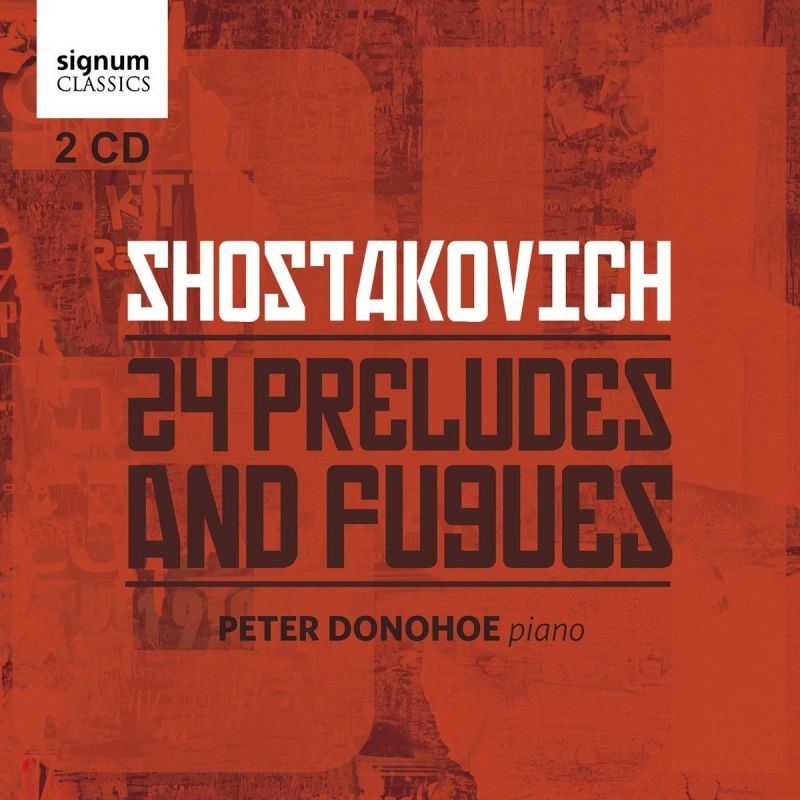SHOSTAKOVICH Preludes and Fugues Op 87
View record and artist detailsRecord and Artist Details
Composer or Director: Dmitri Shostakovich
Genre:
Instrumental
Label: Signum
Magazine Review Date: 05/2017
Media Format: CD or Download
Media Runtime: 148
Mastering:
DDD
Catalogue Number: SIGCD396

Tracks:
| Composition | Artist Credit |
|---|---|
| (24) Preludes and Fugues |
Dmitri Shostakovich, Composer
Dmitri Shostakovich, Composer Peter Donohoe, Piano |
Author: Jed Distler
Peter Donohoe’s clean-cut and perceptive keyboard workmanship attests to a natural affinity for this composer’s idiom, as numerous details bear out. He imbues the G minor’s meditative aura with a lovely singing legato and holds the B minor Prelude’s dotted ‘French overture’ basic rhythm to a firmer, more resolute standard than most. The G sharp minor Prelude’s passacaglia is less deliberate and monumental than usual, with a refreshing sense of forward motion, while its companion Fugue’s zigzag asymmetry manages to sound jazzily casual yet rhythmically on the money, if not quite to Vladimir Ashkenazy’s crisp and nimble specifications.
By taking the B flat minor Fugue’s Adagio marking with a grain of salt, while honoring Shostakovich’s legatissimo directive to the maximum, Donohoe’s conversational and rhythmically strict handling of the three-part counterpoint illuminates the rarely noticed dance behind the music’s dirge-like countenance. And speaking of dance, Donohoe’s ideal pacing for the B major Prelude’s perky gavotte and the humourously accented Fugue that follows evokes appropriate parallels with Shostakovich’s potent theatre scores. While Donohoe’s emphatically arpeggiated chords throughout the D major Prelude are anything but dolce, his approach nevertheless brings a novel textural and linear element to a piece that’s often casually dispatched. Also notice the pianist’s pinpoint dynamic gradations that give uncommon distinction to the D major Fugue’s closely proximate voices – easier said than done.
Certain readings succeed less than others. The blandly phrased all-white keys C major Fugue seems interminable compared to the tension and release that Keith Jarrett generates, despite the latter’s perversely slow tempo (ECM, 9/92). Donohoe’s A minor Fugue starts out in neutral yet becomes more incisive and faster as it proceeds, while he tends to telegraph the big D minor Fugue’s climaxes, in contrast with the more assiduous dynamic architecture distinguishing Craig Sheppard’s live recording (Roméo, 12/15), or the version in the first and finest of Tatiana Nikolayeva’s three cycles (1962, now on Doremi). Still, on the whole, one cannot dispute Donohoe’s high standards and musical intelligence, not to mention his superb and perceptive booklet-notes. I’m happy to have Donohoe on hand, although I won’t give up my reference Ashkenazy and Jenny Lin Shostakovich cycles.
Discover the world's largest classical music catalogue with Presto Music.

Gramophone Digital Club
- Digital Edition
- Digital Archive
- Reviews Database
- Full website access
From £8.75 / month
Subscribe
Gramophone Full Club
- Print Edition
- Digital Edition
- Digital Archive
- Reviews Database
- Full website access
From £11.00 / month
Subscribe
If you are a library, university or other organisation that would be interested in an institutional subscription to Gramophone please click here for further information.




